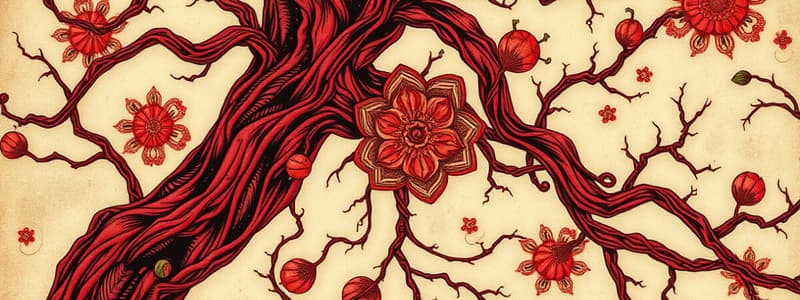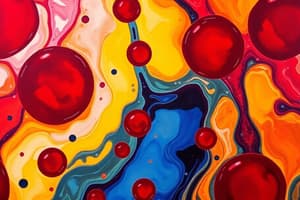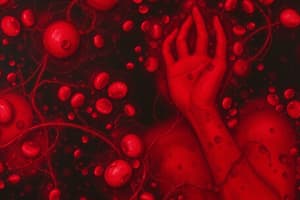Podcast
Questions and Answers
What percentage of blood is made up of plasma, and what are its main components?
What percentage of blood is made up of plasma, and what are its main components?
Plasma makes up 55% of blood and consists of 90% water and 10% dissolved proteins, salts, foodstuffs, and waste materials.
How do red blood cells maximize their efficiency in oxygen transport?
How do red blood cells maximize their efficiency in oxygen transport?
Red blood cells maximize efficiency by lacking a nucleus and mitochondria, allowing more space for hemoglobin to carry oxygen.
What is the primary role of white blood cells in the immune system?
What is the primary role of white blood cells in the immune system?
White blood cells defend the body from attacks by pathogens and contribute to immune responses.
What distinguishes monocytes from other types of white blood cells?
What distinguishes monocytes from other types of white blood cells?
What function do antibodies serve in the blood?
What function do antibodies serve in the blood?
What role do T Cells play in the immune system?
What role do T Cells play in the immune system?
How do B Cells contribute to immune defense?
How do B Cells contribute to immune defense?
What is the primary function of platelets in the body?
What is the primary function of platelets in the body?
What substance do platelets produce to aid in blood clot formation?
What substance do platelets produce to aid in blood clot formation?
How are blood groups determined?
How are blood groups determined?
What is the risk associated with receiving the wrong blood group during a transfusion?
What is the risk associated with receiving the wrong blood group during a transfusion?
What does it mean for blood to be Rhesus positive?
What does it mean for blood to be Rhesus positive?
What happens when a Rhesus negative mother carries a Rhesus positive child?
What happens when a Rhesus negative mother carries a Rhesus positive child?
What percentage of the population has blood group AB?
What percentage of the population has blood group AB?
Which blood type is known as the universal donor and why?
Which blood type is known as the universal donor and why?
Flashcards are hidden until you start studying
Study Notes
Blood Composition
- Plasma constitutes 55% of blood, composed of 90% water and 10% proteins, salts, nutrients, and waste.
Functions of Plasma Proteins
- Clotting proteins prevent blood loss and pathogen entry.
- Antibodies target pathogens and damaged cells for immune response.
- Albumen maintains osmotic balance in the body.
Functions of Dissolved Salts
- Essential for maintaining osmotic balance and cellular function.
Red Blood Cells (RBCs)
- Most abundant blood cells, produced in the red bone marrow.
- Mature RBCs lack a nucleus and mitochondria, enhancing oxygen transport efficiency.
- Biconcave shape filled with hemoglobin; lifespan of about 120 days.
- RBCs are recycled by the spleen and liver, forming bile pigments.
White Blood Cells (WBCs)
- Produced in bone marrow, their count increases during infections.
- Key defenders against pathogens with several types:
- Monocytes: Largest WBC, comprising 7% of white blood cells, engage in phagocytosis and antigen presentation.
- Lymphocytes: Make up 20-40% of WBCs, mostly short-lived; include T-cells (attack invaders) and B-cells (produce antibodies).
Platelets
- Cellular fragments essential for blood clotting.
- Aggregate at wound sites, triggering fibrin production, which forms a clot to prevent blood loss and pathogen entry.
Blood Groups
- Blood type is determined by antigens on the cell surface; crucial for safe blood transfusions.
- Incorrect blood type transfusion can trigger severe allergic reactions.
- Blood Group Distribution:
- O: 55% (neither A nor B antigens, A and B antibodies)
- A: 31% (A antigens, B antibodies)
- B: 11% (B antigens, A antibodies)
- AB: 3% (A and B antigens, no antibodies)
Rhesus Factor
- Identified in Rhesus monkeys; indicates the presence (RhD+) or absence (RhD-) of rhesus protein on blood cells.
Importance in Pregnancy
- If a Rh- mother carries a Rh+ baby, her body may produce antibodies against the baby's Rh antigens.
- This sensitization is usually not harmful in the first pregnancy but can be dangerous in subsequent Rh+ pregnancies.
- To prevent complications, Rh- mothers may receive Rh antibodies after their first child.
Mandatory Practical – Dissecting a Sheep's or Ox's Heart
- Position the heart for dissection, identifying major blood vessels: aorta, pulmonary artery, vena cava, pulmonary vein.
- Cut and examine the left and right ventricles and atria, locating bicuspid and tricuspid valves and their chordae tendinae.
- Observe structural differences between left and right ventricles.
- Identify the septum and the coronary arteries by pumping air through the aorta.
Mandatory Practical – Investigating Pulse Rate and Exercise
- Measure resting pulse at the wrist using two fingers; count beats in 15 seconds and multiply by four for beats per minute.
Studying That Suits You
Use AI to generate personalized quizzes and flashcards to suit your learning preferences.




